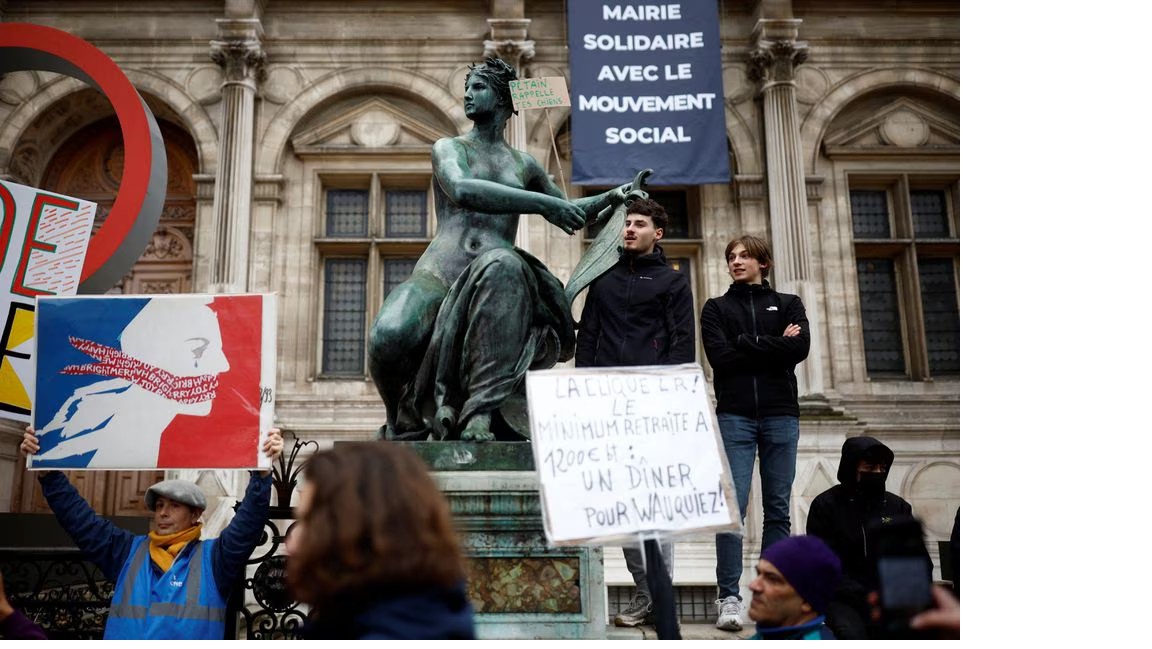PARIS, (Reuters) – French President Emmanuel Macron’s flagship pension reform, which triggered weeks of nationwide protests, received the Constitutional Council’s green light today and can now be signed into law and enter into force swiftly.
The legislation, which pushes up the age at which one can draw a full pension to 64 from 62, has led to huge and sometimes violent protests in recent weeks.
But in what will be a huge relief to Macron and his government, the Constitutional Council gave it the green light with just some minor caveats.
Labour Minister Olivier Dussopt said the law would enter into force on Sept.1 as initially planned, brushing off requests by unions not to promulgate it in the face of huge public opposition.
Opinion polls show a vast majority oppose the reform, as well as the fact that the government invoked Article 49.3 of the constitution allowing it to pass the bill without a final vote in parliament that it might have lost.
Protesters gathered outside Paris City Hall, holding banners reading “climate of anger” and “no end to the strikes until the reform is pulled” when the Council’s verdict was announced.
“We just hope we’ll see a response like the one that followed the 49.3, that the deep anger of the people, workers and students, resurfaces, and that people get back out on the streets,” said unionised train diver Farid Boukhenfer at the Paris rally.
The Council said the government’s actions were in line with the constitution and approved raising the legal retirement age, with only peripheral measures meant to boost employment for older workers struck down on the grounds that they did not belong in this legislation.
Macron and his government hope such an outcome would discourage further trade union-led protests, which have at times turned violent.
“The country must continue to move forward, work, and face the challenges that await us,” Macron said earlier this week.
Hardline unions and the opposition have warned they will not back down.
“The fight continues,” hard-left leader Jean-Luc Melenchon said.
Separately, the Constitutional Council rejected a proposal by the opposition to organise a citizens’ referendum on the pension reform.
The opposition has tabled another bid for a referendum, which should be reviewed by the Council early May.
Political observers say the widespread discontent over the government’s reform could have longer-term repercussions, including a possible boost for the far right.
Far-right leader Marine Le Pen wrote on Twitter that “the political fate of the pension reform is not sealed,” urging voters to back those who oppose it in the next election so that they can scrap it.
Macron says the French must work longer or else the pension budget will fall billions of euros into the red each year by the end of the decade.
But the pension system is a cornerstone of France’s cherished social protection model and trade unions say the money can be found elsewhere, including by taxing the rich more heavily.
While attention has focused on the retirement age of 62, only 36% of French workers retire at that age and another 36% already retire older on account of requirements to pay into the system for at least 42 years in order to be able to claim a full pension.
That means the normal retirement age for a French worker who started working at the age of 22 was 64.5, marginally above a European Union average of 64.3, according to OECD figures based on 2020 data.






